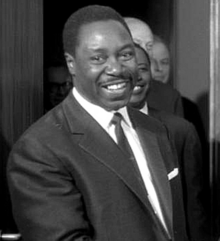Louis Lansana Beavogui
| Louis Lansana Beavogui | |
|---|---|
 |
|
| President of Guinea (Interim) | |
|
In office 26 March 1984 – 3 April 1984 |
|
| Preceded by | Ahmed Sékou Touré |
| Succeeded by | Lansana Conté |
| Prime Minister of Guinea | |
|
In office 26 April 1972 – 3 April 1984 |
|
| Preceded by | Post established |
| Succeeded by | Diarra Traoré |
| Personal details | |
| Born |
28 December 1923 Macenta, French Guinea (now Guinea) |
| Died | 19 August 1984 (aged 60) |
Louis Lansana Beavogui (28 December 1923 – 19 August 1984) was a Guinean politician. He was Prime Minister from 1972 to 1984 and was briefly interim President in 1984.
Beavogui, a member of the Toma ethnic group, was born in Macenta, located in southern Guinea, and he was trained in the Senegalese city of Dakar to become a medic. He was elected as Mayor of Kissidougou when he was 31 years old, and he was elected to the National Assembly of France in January 1956 as one of three deputies representing French Guinea. Under President Ahmed Sékou Touré, Beavogui was appointed to the government as Minister of Economic Affairs and Planning when Guinea gained its independence in 1958, and he was appointed as Minister of Foreign Affairs in 1961. After the Guinean government allowed Kwame Nkrumah, the ousted President of Ghana, to live in exile in Guinea, the authorities in Ghana detained Beavogui at the airport in Accra while he was on his way to Ethiopia for a conference of the Organization of African Unity in October 1966. He remained Foreign Minister until May 1969, when he was moved back to his position as Minister of Economic Affairs.
At the end of the Ninth Congress of the ruling Democratic Party of Guinea (PDG) on 25 April 1972, President Touré said that Beavogui would become Prime Minister; that position had not previously existed. Beavogui served as Prime Minister from 26 April 1972 to 3 April 1984.
Touré died on 26 March 1984. Beavogui succeeded Touré and acted as interim President until 3 April, when he was deposed in a military coup led by Lansana Conté and Diarra Traoré.
...
Wikipedia
